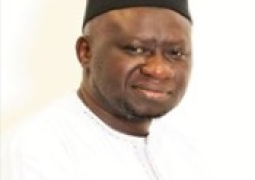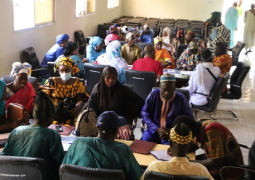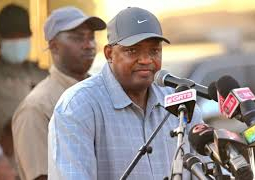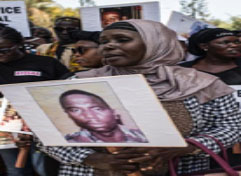
Barrow was captured along with a number of soldiers, including Abdoulie “Dot” Faal on the early hours of 11th November 1994. The AFPRC junta launched a pre-emptive offense after information allegedly reached them that a section of the army was planning to oust them from power. They took both Yundum and Fajara military barracks with very little resistance from the alleged coupists. According to Edward Singhateh and Sana Sabally testimonies at the TRRC, they lined up prisoners and executed them, including Faal and Barrow.
“I can never forgive Yahya Jamnmeh and his colleagues – especially after the lie that Sana Sabally testified against my late husband that they found a note in his pocket claiming to kill them when they succeeded in the 11th November 1994 coup d’etat. This is a big lie, and I found it very upsetting coming from a man who killed my husband in cold blood,” she said.
On the 17th October 2019, former Defence minister, Edward Singhateh testified that he ordered the execution of several soldiers on November 11. This date had for over 24 years been remembered for a mass murder of alleged mutineers from the Gambia National Army. They were led by then Lieutenant Basiru Barrow and Lieutenant Abdoulie Dot Faal. At the time, Sunkary Yarboe was only 25 years old and her eldest kid with the army lieutenant was only 7.
“They (Yahya Jammeh and the AFPRC) can go seek forgiveness from Barrow when they meet him in the hereafter. The physical difficulty visited upon us as his family and the psychological trauma due to his killing can never be forgiven. In fact, it hurts more to hear the voice of Yahya Jammeh even today in our political space. That voice makes our trauma all afresh,” said the widow.
To her, the last time they heard such “coarse, monstrous voice of the dictator” was during the political impasse in December 2016 and January 2017, which drove tens of thousands of civilian families into displaced camps. Besides the killings and disappearances on top of human rights violations, the impasse represented a single more sordid experience visited upon Gambia’s population by a dictator who refused to step down after he was defeated at polls.
At the time of Barrow’s death, his two wives were all left with kids. The struggle for them to bring this family up was never easy. Today, the kids are grown and they have become productive members of society. Their mothers who struggled to feed them, pay for their education and gave them support to where they attained today are almost weary…
Abdul Aziz Barrow, one of Basiru Barrow’s kids, said the ramifications of his father’s death on the family still lingers. “Five kids grew up without a father figure. Our mums had to do extra jobs just to put food on the table and pay our school fees. I remember when our mums were away during the day working tedious jobs just to take care of us, and I and my siblings practically had to raise each other. The difficulties we had to go through in order to be able to pay our school fees was crazy,” Abdul Aziz recounted.
Abdul Aziz like her mum, decried how lonely their family became after the death of their father and husband: “Few family members were willing to help and the ones that did, we have been forever grateful. I remember the day I was graduating from junior school, I could not afford to buy a new pair of shoes and my mum had to borrow money so I could buy new ones in order to feel special on the day. Because she borrowed money from a friend, I cried all the way to the market due to the helplessness feeling... The impact of his death has been immeasurable and it still plays a role in all the decisions we have to take in our adult life.”
Unfortunately for Aziz, he enrolled to study Computer Science Degree at the University of The Gambia but had to drop out of school because of tuition fees. Because he was unemployed, the Victims’ Center offered to offer him a job as a programme officer. In this way, he has also been helping to contribute to the family as a grown up. His father has been described as a patriot by his mum Sunkary Yarboe; a patriot who loved his country and seen as trustworthy among his colleagues in the army.
A soldier who spoke to us on the condition of anonymity described Basiru Barrow as one of the “brains” in the Gambia army back in the days. He was credited with being the “true leader” of the 1994 military coup but their intentions had never been to perpetuate self-rule by Yahya Jammeh. “Rather, it was to put the country back on democracy after the time they agreed to as leaders of the coup was over. Barrow was seen as a threat to Jammeh’s rule and he, like others, had to be eliminated,” the soldier said.
His son, Adbul Aziz keeps doubting himself even today as to whether he had measured to the expectations of his father.“Often times, I am conflicted with the question ‘will my father be proud of who I grew up to be?’”
When his family were called to receive reparations by the TRRC, they expected D600, 000 as promised to them by the Commission. Imagine their disappointment when they were given D114,000, amounting to 19% of the entire amount?
“We were also told that the remaining amount will be paid by the government. My dad is survived by five kids and two wives. So, at the end of the day, none of us will have D100,000 from the amount if we have to split it seven ways. He is also survived by four brothers and four sisters. So you can imagine how the amount will not have a positive impact on any of us,” he said.
Read Other Articles In Headlines
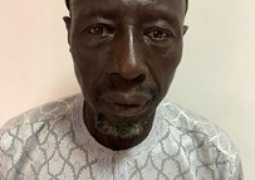
Cleric commends Barrow for strengthening Islamic ties, interfaith peace
Jun 13, 2025, 11:19 AM
